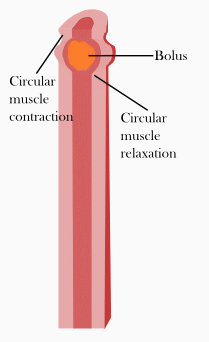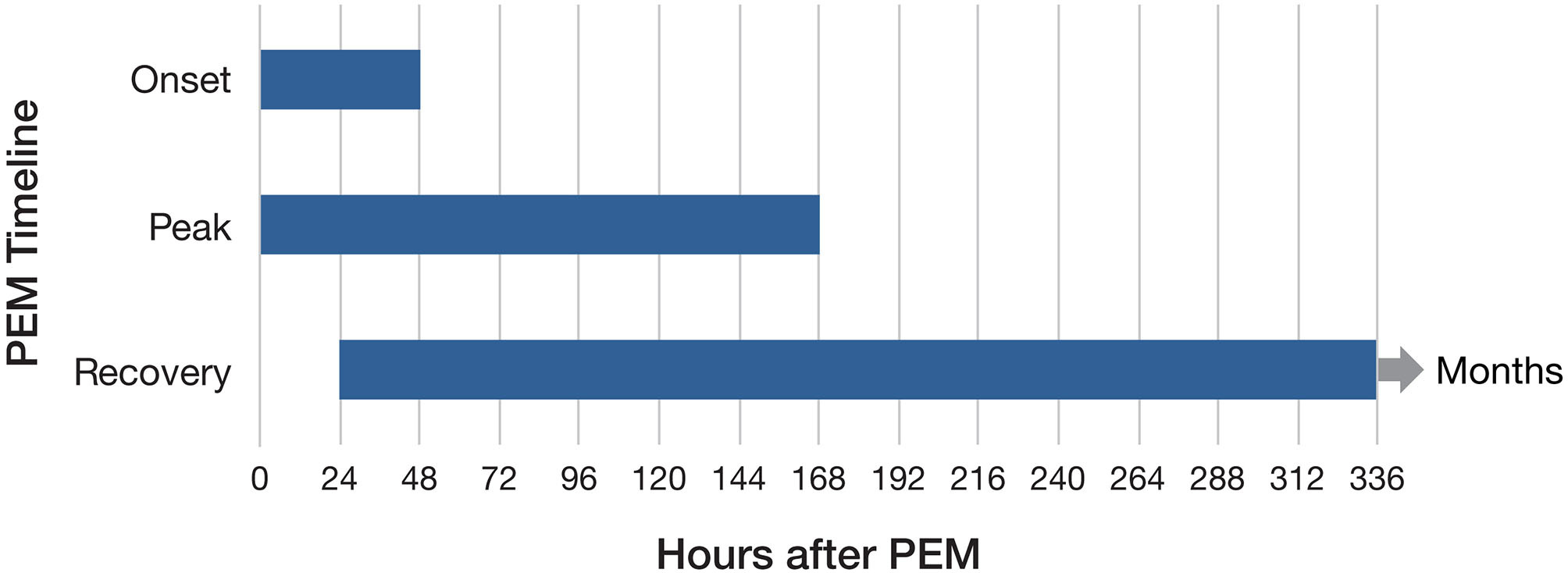|
Irritable Bowel Syndrome
Irritable bowel syndrome (IBS) is a functional gastrointestinal disorder characterized by a group of symptoms that commonly include abdominal pain, abdominal bloating, and changes in the consistency of bowel movements. These symptoms may occur over a long time, sometimes for years. IBS can negatively affect quality of life and may result in missed school or work or reduced productivity at work. Disorders such as anxiety, major depression, and myalgic encephalomyelitis/chronic fatigue syndrome (ME/CFS) are common among people with IBS.The cited review is based on sources ranging from 1988 to 2001 and is probably biased relative to a more recent research. The cause of IBS is not known but multiple factors have been proposed to lead to the condition. Theories include combinations of " gut–brain axis" problems, alterations in gut motility, visceral hypersensitivity, infections including small intestinal bacterial overgrowth, neurotransmitters, genetic factors, and food ... [...More Info...] [...Related Items...] OR: [Wikipedia] [Google] [Baidu] |
Gastroenterology
Gastroenterology (from the Greek gastḗr- "belly", -énteron "intestine", and -logía "study of") is the branch of medicine focused on the digestive system and its disorders. The digestive system consists of the gastrointestinal tract, sometimes referred to as the ''GI tract,'' which includes the esophagus, stomach, small intestine and large intestine as well as the accessory organs of digestion which include the pancreas, gallbladder, and liver. The digestive system functions to move material through the GI tract via peristalsis, break down that material via digestion, absorb nutrients for use throughout the body, and remove waste from the body via defecation. Physicians who specialize in the medical specialty of gastroenterology are called gastroenterologists or sometimes ''GI doctors''. Some of the most common conditions managed by gastroenterologists include gastroesophageal reflux disease, gastrointestinal bleeding, irritable bowel syndrome, inflammatory bowel disease (IBD ... [...More Info...] [...Related Items...] OR: [Wikipedia] [Google] [Baidu] |
Probiotics
Probiotics are live microorganisms that provide health benefits when consumed, generally by improving or restoring the microbiota in the Gut microbiota, gut. Probiotics are considered GRAS, generally safe to consume, but may cause bacteria–Host (biology), host interactions and unwanted side effects in rare cases. There is some evidence that probiotics are beneficial for some conditions, such as helping to ease some symptoms of irritable bowel syndrome (IBS). However, many claimed health benefits, such as treating eczema, or curing vaginal infections lack substantial scientific support. The first discovered probiotic was a certain strain of bacillus in Bulgarian yoghurt, called ''Lactobacillus bulgaricus''. The discovery was made in 1905 by Bulgarian physician and microbiologist Stamen Grigorov. The modern-day theory is generally attributed to Russian Nobel Prize laureate Élie Metchnikoff, who postulated around 1907 that yoghurt-consuming Bulgarian peasants lived longer. A ... [...More Info...] [...Related Items...] OR: [Wikipedia] [Google] [Baidu] |
Small Intestinal Bacterial Overgrowth
Small intestinal bacterial overgrowth (SIBO), also termed bacterial overgrowth, or small bowel bacterial overgrowth syndrome (SBBOS), is a disorder of excessive bacterial growth in the small intestine. Unlike the colon (or large bowel), which is rich with bacteria, the small bowel usually has fewer than 100,000 organisms per millilitre. Patients with SIBO typically develop symptoms which may include nausea, bloating, vomiting, diarrhea, malnutrition, weight loss, and malabsorption by various mechanisms. The diagnosis of SIBO is made by several techniques, with the gold standard being an aspirate from the jejunum that grows more than 105 bacteria per millilitre. Risk factors for the development of SIBO include dysmotility; anatomical disturbances in the bowel, including fistulae, diverticula and blind loops created after surgery, and resection of the ileo-cecal valve; gastroenteritis-induced alterations to the small intestine; and the use of certain medications, including proton ... [...More Info...] [...Related Items...] OR: [Wikipedia] [Google] [Baidu] |
Gastrointestinal Physiology
Gastrointestinal physiology is the branch of human physiology that addresses the physical function of the gastrointestinal (GI) tract. The function of the GI tract is to process ingested food by mechanical and chemical means, extract nutrients and excrete waste products. The GI tract is composed of the alimentary canal, that runs from the mouth to the anus, as well as the associated glands, chemicals, hormones, and enzymes that assist in digestion. The major processes that occur in the GI tract are: motility, secretion, regulation, digestion and circulation. The proper function and coordination of these processes are vital for maintaining good health by providing for the effective digestion and uptake of nutrients. Motility The gastrointestinal tract generates motility using smooth muscle subunits linked by gap junctions. These subunits fire spontaneously in either a tonic or a phasic fashion. Tonic contractions are those contractions that are maintained from several minutes up ... [...More Info...] [...Related Items...] OR: [Wikipedia] [Google] [Baidu] |
Gut–brain Axis
The gut–brain axis is the two-way biochemical signaling that takes place between the gastrointestinal tract (GI tract) and the central nervous system (CNS). The term "microbiota–gut–brain axis" highlights the role of gut microbiota in these Cell signaling, biochemical signaling. Broadly defined, the gut–brain axis includes the central nervous system, neuroendocrine system, neuroendocrine system, neuroimmune systems, the hypothalamic–pituitary–adrenal axis (HPA axis), Sympathetic nervous system, sympathetic and Parasympathetic nervous system, parasympathetic arms of the autonomic nervous system, the enteric nervous system, vagus nerve, and the gut microbiota. Chemicals released by the Gut microbiota, gut microbiome can influence brain development, starting from birth. A review from 2015 states that the gut microbiome influences the CNS by "regulating brain chemistry and influencing neuro-endocrine systems associated with stress response, anxiety and memory function". ... [...More Info...] [...Related Items...] OR: [Wikipedia] [Google] [Baidu] |
Myalgic Encephalomyelitis/chronic Fatigue Syndrome
Myalgic encephalomyelitis/chronic fatigue syndrome (ME/CFS) is a disabling Chronic condition, chronic illness. People with ME/CFS experience profound fatigue that does not go away with rest, as well as sleep issues and problems with memory or concentration. The Pathognomonic, hallmark symptom is post-exertional malaise (PEM), a worsening of the illness which can start immediately or hours to days after even minor physical or mental activity. This "crash" can last from hours or days to several months. Further common symptoms include orthostatic intolerance, dizziness or faintness when upright and pain. The cause of the disease is unknown. ME/CFS often starts after an infection, such as infectious mononucleosis, mononucleosis. It can run in families, but no genes that contribute to ME/CFS have been confirmed. ME/CFS is associated with changes in the nervous and immune systems, as well as in energy production. Diagnosis is based on distinctive symptoms, and a differential diag ... [...More Info...] [...Related Items...] OR: [Wikipedia] [Google] [Baidu] |
Major Depression
Major depressive disorder (MDD), also known as clinical depression, is a mental disorder characterized by at least two weeks of pervasive low mood, low self-esteem, and loss of interest or pleasure in normally enjoyable activities. Introduced by a group of US clinicians in the mid-1970s, the term was adopted by the American Psychiatric Association for this symptom cluster under mood disorders in the 1980 version of the ''Diagnostic and Statistical Manual of Mental Disorders'' (DSM-III), and has become widely used since. The disorder causes the second-most years lived with disability, after lower back pain. The diagnosis of major depressive disorder is based on the person's reported experiences, behavior reported by family or friends, and a mental status examination. There is no laboratory test for the disorder, but testing may be done to rule out physical conditions that can cause similar symptoms. The most common time of onset is in a person's 20s, with females affec ... [...More Info...] [...Related Items...] OR: [Wikipedia] [Google] [Baidu] |
Anxiety Disorder
Anxiety disorders are a group of mental disorders characterized by significant and uncontrollable feelings of anxiety and fear such that a person's social, occupational, and personal functions are significantly impaired. Anxiety may cause physical and cognitive symptoms, such as restlessness, irritability, easy fatigue, difficulty concentrating, increased heart rate, chest pain, abdominal pain, and a variety of other symptoms that may vary based on the individual. In casual discourse, the words ''anxiety'' and ''fear'' are often used interchangeably. In clinical usage, they have distinct meanings; anxiety is clinically defined as an unpleasant emotional state for which the cause is either not readily identified or perceived to be uncontrollable or unavoidable, whereas fear is clinically defined as an emotional and physiological response to a recognized external threat. The umbrella term 'anxiety disorder' refers to a number of specific disorders that include fears (phobias) and ... [...More Info...] [...Related Items...] OR: [Wikipedia] [Google] [Baidu] |
Quality Of Life
Quality of life (QOL) is defined by the World Health Organization as "an individual's perception of their position in life in the context of the culture and value systems in which they live and in relation to their goals, expectations, standards and concerns". Standard indicators of the quality of life include wealth, employment, the environment, physical and mental health, education, recreation and leisure time, social belonging, religious beliefs, safety, security and freedom. QOL has a wide range of contexts, including the fields of international development, healthcare, politics and employment. Health related QOL (HRQOL) is an evaluation of QOL and its relationship with health. Engaged theory One approach, called the engaged theory, outlined in the journal of ''Applied Research in the Quality of Life'', posits four domains in assessing quality of life: ecology, economics, politics and culture. In the domain of culture, for example, it includes the following subd ... [...More Info...] [...Related Items...] OR: [Wikipedia] [Google] [Baidu] |
Bowel Movement
Defecation (or defaecation) follows digestion and is the necessary biological process by which organisms eliminate a solid, semisolid, or liquid waste material known as feces (or faeces) from the digestive tract via the anus or cloaca. The act has a variety of names, ranging from the technical (e.g. bowel movement), to the common (like pooping or crapping), to the obscene ('' shitting''), to the euphemistic ("doing number two", "dropping a deuce" or "taking a dump"), to the juvenile ("going poo-poo" or "making doo-doo"). The topic, usually avoided in polite company, forms the basis of scatological humor. Humans expel feces with a frequency varying from a few times daily to a few times weekly. Waves of muscular contraction (known as ''peristalsis'') in the walls of the colon move fecal matter through the digestive tract towards the rectum. Flatus may also be expulsed. Undigested food may also be expelled within the feces, in a process called ''egestion''. When birds defeca ... [...More Info...] [...Related Items...] OR: [Wikipedia] [Google] [Baidu] |
Bloating
Abdominal bloating (or simply bloating) is a short-term disease that affects the gastrointestinal tract. Bloating is generally characterized by an excess buildup of gas, air or fluids in the stomach. A person may have feelings of tightness, pressure or fullness in the stomach; it may or may not be accompanied by a visibly distended abdomen. Bloating can affect anyone of any age range and is usually self-diagnosed. In most cases it does not require serious medical attention or treatment. Although this term is usually used interchangeably with abdominal distension, these symptoms probably have different pathophysiological processes, which are not fully understood. The first step for management is to find a treatment for the underlying causes that produce it through a detailed medical history and a physical examination. The discomfort can be alleviated by the use of certain drugs and dietary modifications. Bloating can also be caused by chronic conditions and in rare cases can be a ... [...More Info...] [...Related Items...] OR: [Wikipedia] [Google] [Baidu] |
Abdominal Pain
Abdominal pain, also known as a stomach ache, is a symptom associated with both non-serious and serious medical issues. Since the abdomen contains most of the body's vital organs, it can be an indicator of a wide variety of diseases. Given that, approaching the examination of a person and planning of a differential diagnosis is extremely important. Common causes of pain in the abdomen include gastroenteritis and irritable bowel syndrome. About 15% of people have a more serious underlying condition such as appendicitis, leaking or ruptured abdominal aortic aneurysm, diverticulitis, or ectopic pregnancy. In a third of cases, the exact cause is unclear. Signs and symptoms The onset of abdominal pain can be abrupt, quick, or gradual. Sudden onset pain happens in a split second. Rapidly onset pain starts mild and gets worse over the next few minutes. Pain that gradually intensifies only after several hours or even days has passed is referred to as gradual onset pain. One can ... [...More Info...] [...Related Items...] OR: [Wikipedia] [Google] [Baidu] |






